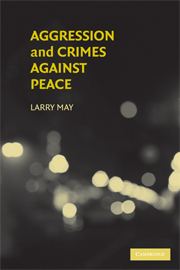Book contents
- Frontmatter
- Contents
- Acknowledgments
- PART A PACIFISM AND JUST WARS
- PART B RETHINKING THE NORMATIVE AD BELLUM PRINCIPLES
- 4 The Principle of Priority or First Strike
- 5 The Principle of Just Cause
- 6 The Principle of Proportionality
- PART C THE PRECEDENT OF NUREMBERG
- PART D CONCEPTUALIZING THE CRIME OF AGGRESSION
- PART E HARD CASES AND CONCLUDING THOUGHTS
- Bibliography
- Index
5 - The Principle of Just Cause
Published online by Cambridge University Press: 13 November 2009
- Frontmatter
- Contents
- Acknowledgments
- PART A PACIFISM AND JUST WARS
- PART B RETHINKING THE NORMATIVE AD BELLUM PRINCIPLES
- 4 The Principle of Priority or First Strike
- 5 The Principle of Just Cause
- 6 The Principle of Proportionality
- PART C THE PRECEDENT OF NUREMBERG
- PART D CONCEPTUALIZING THE CRIME OF AGGRESSION
- PART E HARD CASES AND CONCLUDING THOUGHTS
- Bibliography
- Index
Summary
In the Just War tradition, a distinction is drawn between the justification of initiating and waging war, jus ad bellum, and the justification of tactics during war, jus in bello. The main jus ad bellum normative principle is called “just cause.” Traditionally, just cause referred to a wrong that a State had committed, which initially legitimated war as a response. The two main just causes were unprovoked attacks on either one's own State or another State. In the past, just causes could involve either the prevention of those attacks or the punishment of them. Today, punishment is a highly contentious just cause, whereas prevention of attack on one's own or another State is still considered to be the most important of the just causes to go to war. Just cause only addresses a prima facie case to go to war, where there are other conditions that also need to be satisfied, principally proportionality, in order for the war to be just.
The principle of just cause is also at the core of what constitutes an aggressive war in contemporary international law. Traditionally, jus ad bellum principles were employed to determine whether a State was justified in its use of force. In the trials at Nuremberg, jus ad bellum principles were employed to determine whether individuals should be prosecuted for initiating aggressive war, and more recently, the International Criminal Court is considering the prosecution of aggression as well.
- Type
- Chapter
- Information
- Aggression and Crimes Against Peace , pp. 94 - 116Publisher: Cambridge University PressPrint publication year: 2008



